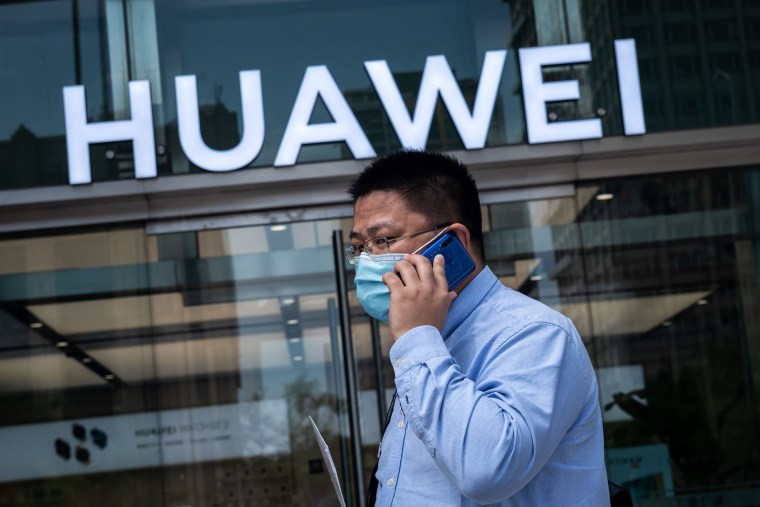LONDON — The United Kingdom announced Tuesday that Huawei would be banned from its high-speed 5G telecommunications network, in a decision that will anger China but please the United States.
The role of the Chinese tech giant has become a central theme in London's increasingly uneasy relationship with Beijing.
The U.K. has faced months of pressure from Washington, which says Huawei is a security risk because the company could be used by the Chinese government to spy on the West. Both China and Huawei have repeatedly denied this.
"There's no such thing as a perfectly secure network," Media Secretary Oliver Dowden told the House of Commons, but he said that the U.K. had to make sure its system was "as secure as it possibly can be."
He announced that all new Huawei 5G equipment would be banned in the U.K. starting next year, and that the government would remove all of the company's existing infrastructure by 2027.
The decision attempts to balance technology, geopolitics and the practical impact on consumers. Dowden conceded that banning Huawei would delay the U.K.'s 5G rollout by two years and cost up to 2 billion pounds, around $2.5 billion.
"This disappointing decision is bad news for anyone in the UK with a mobile phone. It threatens to move Britain into the digital slow lane, push up bills and deepen the digital divide," Huawei's U.K. spokesman Ed Brewster said in a statement.
The decision had become "politicized," he added, and was more about U.S. trade friction with China than real security concerns. The company will now conduct a detailed review of the decision and continue to work with the U.K. government to "explain how we can continue to contribute to a better connected Britain," he said.
The U.K.'s widely anticipated decision came after a meeting earlier Tuesday of Britain's National Security Council, which was chaired by Prime Minister Boris Johnson.
Back in January, Johnson attempted a compromise that he hoped would placate both Beijing and Washington. Huawei was to be allowed a limited role in building the country's 5G network, but prevented from accessing "sensitive" core areas and those near military or nuclear sites.
Tuesday's announcement was a reversal of that move. The official reason was that U.S. sanctions on Huawei, banning it from using American microchips, would make the Chinese company's technology unreliable in the future.
But the backdrop is one of a mighty struggle between the U.S. and China spanning technology and trade. A central strand of that is 5G, which offers speeds 10 times faster than 4G and promises to reshape many aspects of daily life. Its providers will be powerful players in the coming years.
"Today’s decision by the UK to ban Huawei from its 5G networks advances Transatlantic security in the #5G era while protecting citizens’ privacy, national security, and free-world values," tweeted Secretary of State Mike Pompeo following the announcement on Tuesday.
U.S. Ambassador to the U.K., Woody Johnson, also tweeted saying Britain's "decision to protect its national security" was also a "win for fair trade and human rights."
While London has been a key U.S. ally for decades, just five years ago its government embarked on what it said would be a "golden era" of engagement with China. It now finds itself caught in the middle of this standoff just as it is attempting to strike out on its own by leaving the European Union, the world's biggest political and economic bloc.
The U.S. points to China's National Intelligence Law of 2017, which says companies must "support, cooperate with and collaborate in national intelligence work." Many of Johnson's own Conservative lawmakers are similarly uneasy about the firm's presence in Britain.
Added to that, there has been a feeling of dismay in the U.K. and the U.S. at what they see as China's crackdown on liberties in Hong Kong and alleged attempts to cover up aspects of the early stages of the coronavirus pandemic, both of which China rejects.
Huawei denies it has been asked to give up its data or that it would ever do so. It insists that for the next five years at least, it can supply U.K. hardware unaffected by U.S. sanctions.
China's ambassador to the U.K., Liu Xiaoming, warned the British government last week that "if you want to make China a hostile country, you will have to bear the consequences."
Other telecom companies, such as BT and Vodafone, have cautioned that ripping out Huawei tech, which the U.K. has used in some form since 2005, could take years and result in blackouts for their customers.
The European tech giants Ericsson and Nokia are also capable of building 5G infrastructure but some business leaders have warned such a sweeping change in course would be pricey and incur lengthy delays.

